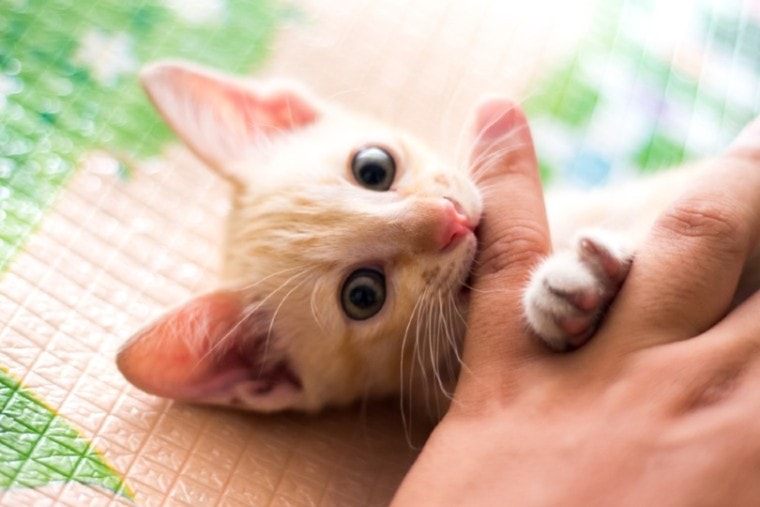
It’s fun to play with a frisky kitten but that playfulness can lead to biting, which is not so fun, especially when this biting behavior continues into your kitten’s adulthood.
Why do kittens bite and how can you stop your kitten from biting during play? Just like puppies, biting is normal behavior for kittens, but it can get out of control. Here are some of the most common reasons why kittens bite.
The 6 Reasons Why Kittens Bite
1. Biting is part of the learning process.
Sometimes a gentle bite, called mouthing, is a way for a young kitten to learn about new things in its environment. They explore how things feel and taste with their mouths, just like puppies and human babies.
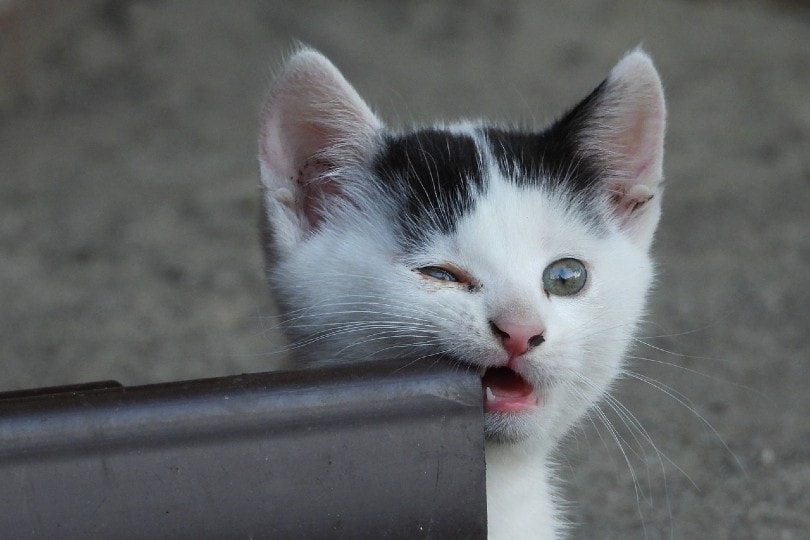
2. Biting is a natural behavior for predators.
Cats are predators, so learning the right way to hunt and bite is important to their survival as adults. In a litter of kittens, they often stalk and bite each other during play. If there are no other animals around, you might be the “prey” that they stalk and bite. Play-hunting is a natural practice for adulthood.
3. They are seeking attention.
Biting can sometimes be a way for kittens to get attention. Just like children, they can “act out” and seek your attention even if it’s negative. Are you busy on the computer or watching TV? Biting may be your kitten’s way of telling you it wants to interact with you.
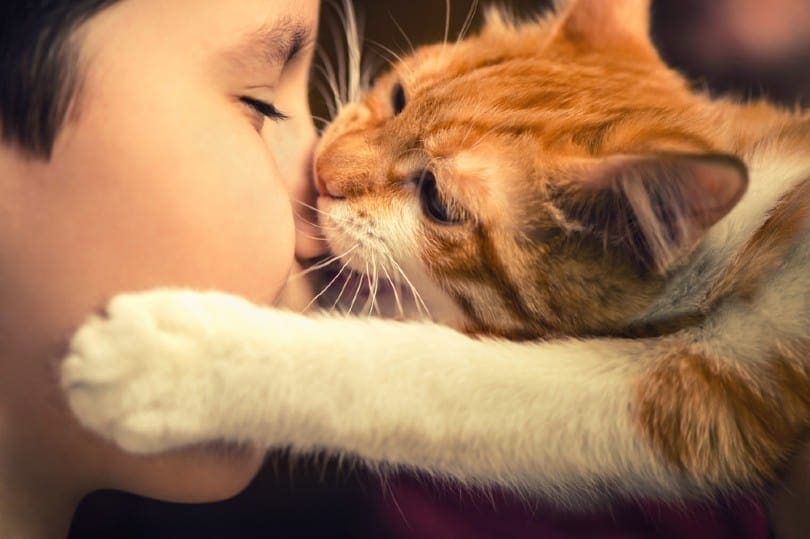
4. Rough play can encourage biting.
It’s fun to play with a rambunctious kitten, but sometimes too much rough play can encourage your kitten to bite. And if they get used to biting during play while they are small, you may end up with a full-grown cat (with full-sized teeth) that’s prone to biting too.
5. Your kitten may be teething.
All young animals will feel the urge to bite when they’re teething, including kittens. They might not make as big a fuss about it as human babies, but they can feel some discomfort too. We’ll talk about how to help a teething kitten in the next section.
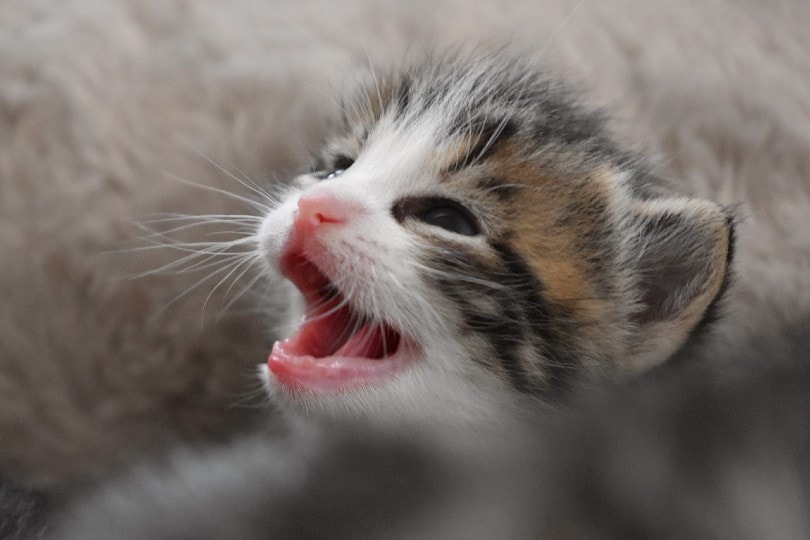
6. Your kitten may have left its mom too soon.
As we’ve noted, kittens will often play-bite with their littermates when they are very small. Normally, a kitten will learn from its mother (and siblings) when the biting gets out of control and it’s time to stop. A kitten separated from mom too soon will not have learned how to moderate its biting behavior.
How to Stop a Kitten From Biting
Biting during play is a normal part of kittenhood, but there are ways to control it positively so that your kitten doesn’t grow up to be a biter as an adult cat.
1. Reward good behavior.
Offer your kitten a treat or toy reward or even just some extra affection when it plays with little or no biting. Positive reinforcement is the best way to encourage good behavior.

2. Never punish your kitten for biting.
Punishment is never a good idea, especially for biting, which is a normal kitten behavior. Strong punishment can lead to fear, anxiety, and even more biting and aggression. You can try saying “no biting” but don’t yell or use physical punishment.
3. Don’t encourage rough play.
Getting your kitten overexcited with rough play is a sure way to encourage biting. Don’t let your kitten bite you during play. If your kitten starts to bite your hand, take a break, or redirect your kitten’s attention to a toy.
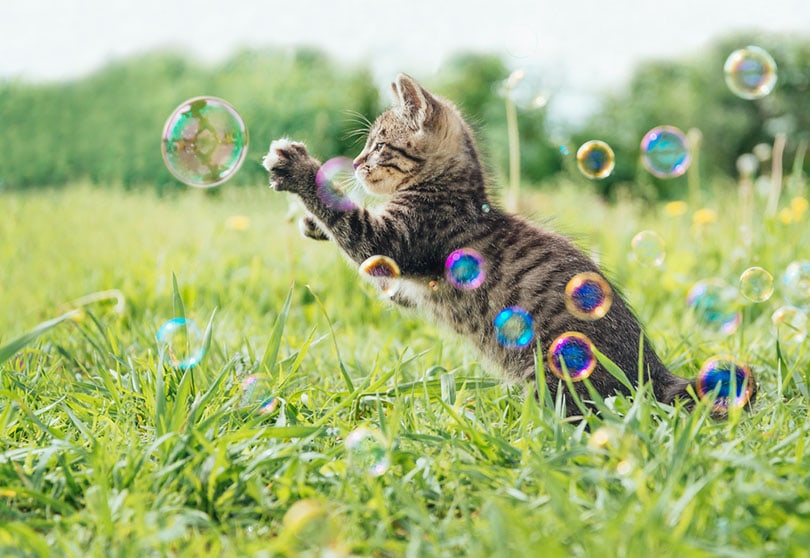
4. Get kitten teething toys.
If your kitten is teething, getting one or two soft rubber pet teething toys can help redirect biting from you to something that will make your kitten feel better. Yes, teething toys are not just for puppies, you can find little ones for kittens too.
5. Use toys that keep your hands out of reach.
Biting your hands during play doesn’t mean you have to stop playing. All kinds of toys can entertain your kitten while keeping your hands out of play. You can try wand or fishing rod toys, ball in track toys, stuffed kick toys, tunnels, and laser pointers.
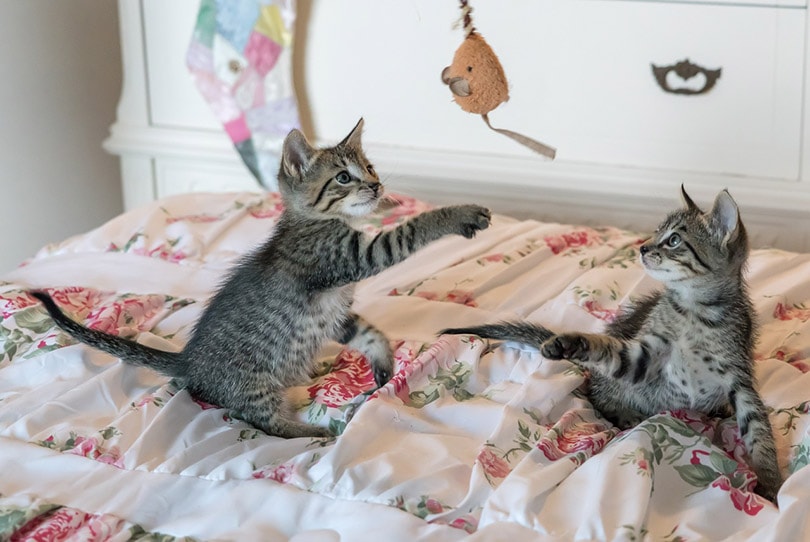
6. Play with your kitten every day.
Your kitten needs regular interaction with you, especially if there are no other pets in the home. Make time for daily play sessions with your kitten. This will satisfy your kitten’s need to play and tone down the over-excited biting by making interactive play a normal part of the daily routine.
Related Read: 9 Best Cat Toothpastes – Reviews & Top Picks
Do Kittens Grow Out of Biting?
Don’t get discouraged if your kitten is a biter. Biting is a normal part of kitten development. Your kitten will grow out of biting and become more mellow with age.
The best way to ensure that kittens will not grow into adult cats that bite is to discourage too much biting when they are young.
A little consistent discipline (and self-discipline on your part) during playtime will help your kitten grow into a well-socialized cat.
You might also be interested in:
- Cat Teeth Cleaning: Is It Necessary? (Vet Approved Answers)
- Cat Bite Infection Symptoms to Watch Out For – Vet Approved Advice
Featured Image Credit: yiamXstoneman, Shutterstock






